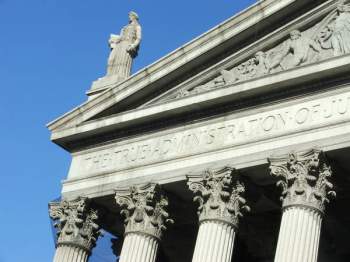
An Overview of the 24th Amendment

Popular In Constitution
Purpose Of Lifetime Appointment And Pros And Cons Enumerated Powers Bicameral Legislature Background Article 3 Of The Constitution We The People 1st Amendment Who Wrote The Constitution Judicial Review Equal Protection Clause 5th Amendment 10th Amendment Three Fifths Compromise
What is the 24th Amendment?
“Section 1. The right of citizens of the United States to vote in any primary or other election for President or Vice President, for electors for President or Vice President, or for Senator or Representative in Congress, shall not be denied or abridged by the United States or any State by reason of failure to pay any poll tax or other tax.
Section 2. The Congress shall have power to enforce this article by appropriate legislation.”
The 24th Amendment Defined
Date Proposed
The 24th Amendment was proposed on August 27th, 1962
Date Passed
The 24th Amendment was passed on January 23rd, 1964
President of the United States
Lyndon B. Johnson was the President of the United States during the ratification of the 24th Amendment
Stipulations of the 24th Amendment
The 24th Amendment expresses the inability of a Federal or State government to deny a citizen of the United States the right to vote as a result of failure to satisfy the required payments of a poll tax
The poll tax was a tax that was prevalent within Southern states; as its name suggests, a poll tax was instituted in order to validate an individual’s right to vote subsequent to the payment of the tax; poll taxes were typically instituted with regard to specific races and socioeconomic classes in lieu of institution based on property and possessions
The 24th Amendment eliminated applicable Grandfather Clauses, legal exploitation, and prejudicial examinations with regard to the classification of the individuals required to satisfy a poll tax payment in order to retain the right to vote
24th Amendment Facts
The poll tax was deemed unconstitutional in 1966; the Supreme Court had deemed that it was in direct violation of the protection clause passed in the 14th Amendment
Virginia, Alabama, Texas, Arkansas, and Mississippi were the only states to enforce a poll tax at the time of the ratification of the 24th Amendment; many lobbyists suspected the poll tax of further disenfranchising African Americans and prospective Northern sympathizers through the enforcement of contingency-based suffrage
John F. Kennedy had expressed an interest in eliminating the poll tax during his presidency
States Ratifying the 24th Amendment
1. Alabama
2. Alaska
3. California
4. Colorado
5. Connecticut
6. Delaware
7. Florida
8. Hawaii
9. Idaho
10. Illinois
11. Indiana
12. Iowa
13. Kansas
14. Kentucky
15. Maine
16. Maryland
17. Massachusetts
18. Michigan
19. Minnesota
20. Missouri
21. Montana
22. Nebraska
23. Nevada
24. New Hampshire
25. New Jersey
26. New Mexico
27. New York
28. North Carolina
29. North Dakota
30. Ohio
31. Oregon
32. Pennsylvania
33. Rhode Island
34. South Dakota
35. Tennessee
36. Texas
37. Utah
38. Vermont
39. Virginia
40. Washington
41. West Virginia
42. Wisconsin
States Not Participatory in the Ratification of the 24th Amendment
1. Arizona
2. Arkansas
3. Georgia
4. Louisiana
5. Mississippi
6. Oklahoma
7. South Carolina
8. Wyoming
Court Cases Associated with the 24th Amendment
Breedlove v. Suttles (1937) – this court case validated the legality of the poll tax, expressing that individual states were permitted to regulate the suffrage policies within their respective jurisdiction
Harper v. Virginia Board of elections (1966) – this court case overturned an individual state’s ability to regulate suffrage policies; as a result of this decision, the poll tax was deemed to be unconstitutional
NEXT: Twenty Fifth Amendment





















